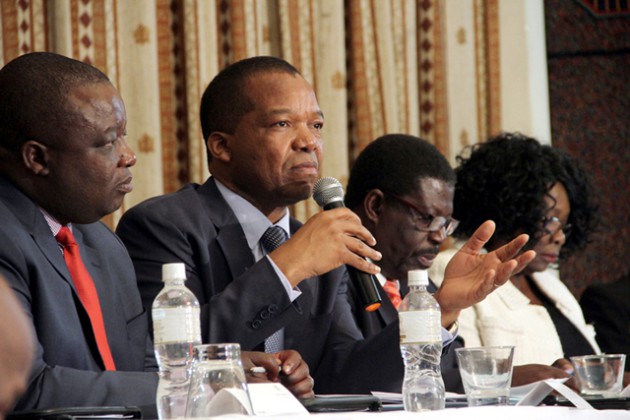‘Importing cash not one-day process’


Reserve Bank of Zimbabwe Governor Dr John Mangudya (second left) addresses delegates while flanked by Industry and Commerce Minister Mike Bimba (second right), Bankers Association of Zimbabwe president Dr Charity Jinya (right) and ZNCC president Davison Norupiri and at the Zimbabwe National Chamber of Commerce breakfast meeting in Harare yesterday. — (Picture by Tawanda Mudimu)
Business Reporters
THE Reserve Bank of Zimbabwe governor Dr John Mangudya has said that international banking regulations dictate that limited amounts of cash are imported at any given time and just like individual depositors had a maximum daily withdrawal, banks were also subjected to the same by correspondent banks.Speaking at the Zimbabwe National Chamber of Commerce dialogue on the cash situation yesterday, both Dr Mangudya and Bankers Association of Zimbabwe president Dr Charity Jinya acknowledged that importing cash was not an overnight process as banks were subjected to Customer Due Diligence (CDD) from their correspondent banks.
A correspondent bank is a financial institution that provides services on behalf of another, equal or unequal, financial institution.
“People should understand that there are limitations in importing cash. For instance,if you import cash worth $10 million a month, you just cannot increase that amount.
“Those countries where we import cash do their CDD meaning that if you change the import size they will raise questions especially in light of Money Laundering regulations,” said Dr Mangudya.
Dr Jinya also added that questions would be raised internationally if banks continue importing more cash than they would normally require.
The RBZ this week injected $15 million into the market to ease the cash crisis but Dr Mangudya said the cash shortages are likely to resurface by today as pensioners start receiving their pay outs.
Dr Mangudya, however, bemoaned the rate at which the financial services sector is losing funds through externalisation.
“There is too much externalisation in this economy. So even if we import, that money is not coming back into the system. These unscrupulous businesspeople are taking money. We are feeding the looters.
“Lets not create a Sodom and Gomorrah of foreign exchange and externalisation of funds in Zimbabwe. The situation is getting out of hand and I am seeing suspicious transactions every day,” said Dr Mangudya.
Meanwhile, Dr Mangudya moved to clarify the revisions to the foreign exchange control measures introduced last week.
In a statement on Tuesday, the central bank said it had revised the foreign exchange management measures it announced last week and at its January Monetary Policy Statement in recognition of what it says is the need to improve the ease of doing business.
According to the regulations, 50 percent of all new foreign exchange receipts from the export of goods and services denominated in US$ shall be transferred to the central bank immediately on receipt of the funds with the remaining funds credited into the exporter’s FCA in US$.
On receipt of the 50 percent export proceeds into its nostro account, the central bank shall immediately credit the same amount plus the 5 percent export incentive in US$ into the exporters RTGS account of the exporter.
“Accordingly, the requirement for the apportionment of 50 percent of foreign exchange receipts into 40 percent South African rands and 10 percent euro has been removed with immediate effect.”
Dr Mangudya said that review was only to standardise and match with the regulations which had been introduced in the tobacco and gold sectors.
“The revisions are more operational and administrative, not much has changed. They are meant to align everything with what is happening in tobacco and gold. We cannot have two systems; where we have different measures for tobacco and gold; so the measures will now be uniform.”
Dr Mangudya also said that the rand/euro conversion will now be administered by banks.
“The banks will administer the spread of currencies so as to minimise concentration on one currency. We realised that if we had converted on the exporters’ proceeds, it would be like a penalty to them yet they are the goose which lays the golden eggs.”
In addition to the foreign exchange priority list announced last week, the central bank also extended payment categories which shall be included on Priority One (High).
According to the new Priority One list, remittance of rental income from properties owned by non-resident Zimbabweans and foreigners who would have purchased property using funds originating from offshore and transferred through normal banking channels.
The list will also now include the remittance of pension income for non-resident Zimbabweans who formally emigrated from Zimbabwe and importation of packaging material not available in Zimbabwe
The central bank removed the 10 percent threshold on nostro account balances after they were reviewed in January from 5 percent. It also removed the 15 percent threshold on cash holdings by banks.
The statement also said that Money Transfer Agencies or authorised dealers with limited authority (ADLA) who make cash withdrawals for the purposes of paying Diaspora remittances are not restricted by cash withdrawal limits.
“However, authorised dealers are reminded to exercise the application of the Know Your Customer and CDD in disbursing cash to these entities.”










Comments